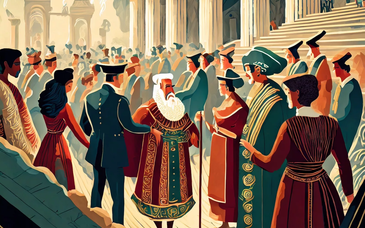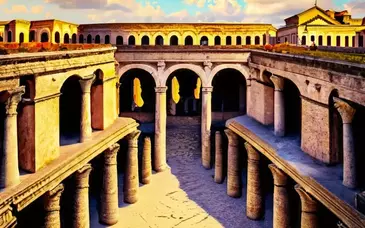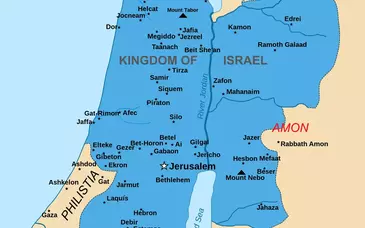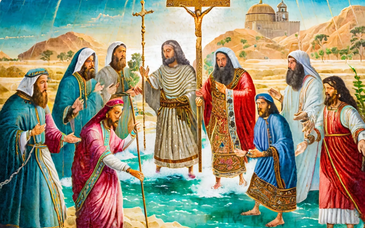1. Brief Account of Events Said to Have Occurred
Jewish and Roman histories begin to intersect at this point, so that one cannot discuss Jewish history without discussing Roman history (The reverse is not as true, of course). When Salome died in 67 BCE, there arose a conflict between Hyrcanus II and his brother Aristobolus II over who would become both High Priest and king. The people opted for Aristobolus II, but the matter did not end there. Hyrcanus II, backed by Antipater, an Idumean, and the army of the Nabataean king, Aretas, who had lost much territory to the Jews, demanded that Hyrcanus II be reinstated as High Priest and made king.
Meanwhile, Pompey had made his appearance in Asia, owing to rebellion by Mithridates VI Eupator, the king of Pontus. Earlier, in 89 BCE, Mithridates invaded parts of Asia massacring all the Roman inhabitants of the province. (Asia became a province four years after the death of Attalus III in 133 BCE, who willed his kingdom centered in Pergamum to Rome; the Romans combined this territorial bequest with territory taken from the Seleucid kingdom [Antiochus III in 189 BCE] to form one administrative unity, the province of Asia.) In response, the Roman senate sent the consul Lucius Cornelius Sulla with five legions to fight against Mithridates; he defeated him, forced him to retreat to his original position and imposed indemnity on him (First Mithridatic War between 88-84 BCE). A second war was fought successfully by the Romans from 83-82 BCE. A third war broke out when Nicomedes III, the king of Bithynia (to the east of Pontus) bequeathed his kingdom to Romans, who organized it into a province; Mithridates VI Eupator, the king of Pontus, however, also coveted the territory, and began a campaign to take control of the former kingdom of Bithynia. To counter this threat, the Roman senate gave Pompey the authority to attack Mithridates. Pompey defeated Mithridates in 66 BCE (Third Mithridatic War 74-63 BCE). While in Asia, Pompey heard from one of his generals, (Aemilius) Scaurus, who had been sent to Syria, of the dispute going on in Jerusalem between Hyrcanus II and Aristobolus II and their respective supporters. Scaurus began to travel to Judea to capitalize on this crisis; hearing that the Roman general on his way to Judea, both Aristobolus II and Hyrcanus II sent emissaries to him to gain his support for their causes. This was the beginning of the end of the Hasmonean dynasty and Jewish independence.
Scaurus decided in favor of Aristobolus II, and ordered Aretas to withdrew, which he did. In the meantime, Pompey conquered Syria, and Syria was made into a Roman province with a proconsul; the rest of the Seleucid kingdom by this time had dissolved. While in Damascus in 63 BCE, three delegations from three Jewish parties met with Pompey in order to influence Pompey’s decision; these were Aristobolus' party, Hyrcanus' party and a theocratic party that wanted rule by High Priest. (It seems that Aristobolus II and Hyrcanus II were both present in Damascus.) Pompey asked that the three maintain the peace until he finished his campaign against the Nabataeans. But Aristobolus II gave Pompey reason to suspect his loyalty by suddenly leaving Damascus and beginning to return to Jerusalem. Pompey followed Aristobolus II and demanded his surrender. Eventually Aristobolus II went to Pompey's camp near Jerusalem, and capitulated. But in the meantime, the people of Jerusalem had shut the gates of the city against Pompey; Pompey took Aristobolus II prisoner, and marched on the city. The gates were opened to him by the supporters of Hyrcanus II; the supporters of Aristobolus II took refuge in the Temple mount in the lower city. Pompey besieged the Temple, and within three months broke through the walls and killed c. 12,000 Jews. The borders of the Jewish state were greatly reduced; what remained was Judea, Idumea, Perea and Galilee
Pompey installed Hyrcanus II as High Priest, but did not give him the title of king. He took Aristobolus II and many Jewish prisoners of war to to Rome, where they settled In 57 BCE, Alexander, the son of Aristobolus II, who escaped from captivity on the way to Rome, attempted to seize power, but was defeated by Gabinius, proconsul of Syria; in 57 BCE also, Hyrcanus II was stripped of all political power, and Gabinius the proconsul of Syria divided the Jewish state into five regions, each under his immediate control. This was the end of an independent Jewish state. In 56-55 BCE, Aristobolus II and his son Antigonus also tried in vain to take power of the former Jewish state.
2. Primary Sources
2.1. Reading: Josephus, Antiquities 14.1.2-7.3; 4-122 (Translated by W. Whiston)
2.2. Reading: Josephus, War 1.6.1-8.9; 120-82 (Translated by W. Whiston)

Gnaeus Pompeius, born in 106 BCE, supported the victorous patrician Cornelius Sulla in the civil war against the supporters of the populist Gaius Marius (84-78 BCE). After re-conquering Spain, Pompey returned to Italy to help M. Licinius Crassus end the slave revolt led by the gladiator Spartacus (71 BCE). He was then elected as consul of Rome in 70 BCE. Before he replaced Lucullus as general in charge of waging war against Mithridates, Pompey was assigned the task in ridding the Mediterranean of pirates, which he succeeded in dong in 67 BCE.
In an extremely fragmentary text that appears to be a record of the proper rotation of priests based on a six-year cycle (4Q323-24), there are references to historical events around the time of the appearance of the Romans in Palestine. Unfortunately, because these texts are so fragmentary, the events referred to are unknown. What does remain are the names of important Jewish historical figures from this time: "Shemalizion" = Salome Alexandra (C-a 2.4; C-e 1.7); "Hyrcanos" (C-a 2.6) and ; "the High Priest... Jochanan" (C-e 1.1-2) = John Hyrcanus I or John Hyrcanus II. In addition, the phrase "Aemilius killed" occurs, which no doubt is a reference to the fact that Aemilius Scaurus killed Jews either as a general under Pompey or a proconsul of Syria.
Diagram of the Hasmonean Dynasty
3. More Detailed Account of Events Said to Have Occurred with Citation of Sources
(*=significant apparent disagreement in sources)
| Date BCE | Events | Sources |
| 67 | Aristobolus II, being the more ambitious of the two brothers, declares war on his brother, Hyrcanus II who is defeated in battle near Jericho; most of his soldiers defected to his brother. He takes refuge in the citadel (the Baris, later renamed the Antonia) where Aristobolus' wife and children are being held (see Ant. 13.16.5; 426). Holding them as hostages, Hyrcanus negotiates an agreement with his brother that he would become a private citizen and Aristobolus would become king and High Priest. | Ant. 14.1.2; 4-7; War 1.6.1; 120-22; see Ant. 14.3.2; 41; 14.6.1; 97; 20.10.4; 243-44 *Josephus gives the date in Olympian (third year of the 177 Olympiad) and consular years, which would place the dates of Aristobolus' victory over his brother in 69 BCE. |
| c. 67-65 | An enemy of Aristobolus, Antipater, an Idumean who was appointed governor of Idumea by Alexander Jannaeus, convinces Hyrcanus that his life is in danger as long as his brother is in power. Besides, he points out that Aristobolus is not the rightful heir to the throne, being the younger brother. (His real motives are fear of Aristobolus and a desire to preserve his own political power.) Antipater advises Hyrcanus to flee to Aretas III, the Nabataean king at Petra, who can protect him and make good on his claim to the throne. In exchange for his support, Aretas III is promised the restoration of twelve cities that were taken from the Nabataeans by Alexander Jannaeus. | Ant. 14.1.3-4; 8-18; War 1.6.2; 123-26 *Finding a political motive in this assertion, Josephus corrects the statement of Nicolas of Damascus that Antipater's family were Jews who had settled in Palestine from Babylon. |
| 66-65 | The Third Mithridatic War between Rome and the Mithridates VI Eupator, king of Pontus, breaks out when Nicomedes III, the king of Bithynia (to the east of Pontus) bequeathed his kingdom to Romans; Mithridates plans to expand his own kingdom by the incorporation of Bithynia. To counter this threat, the Roman senate gives Pompey the authority to attack Mithridates VI Eupator, the king of Pontus. (Pompey replaces Lucullus.) Pompey defeats Mithridates in 66 BCE (Third Mithridatic War 74-63 BCE), and also forces the surrender of Tigranes, the Armenian king. Pompey makes Syria into a Roman province at this time (Seleucid rule came to an end with the invasion of Tigranes, who lost control of Syria to Lucullus.) | Ant. 14.2.3; 29; War 1.6.2; 127; see Appian, Mithr. 97-119; Diod. 37.53; Plutarch, Pomp. 32-39 |
| 65 | With the backing of Aretas, Hyrcanus (and Antipater) defeat Aristobolus, who is then forced to retreat to Jerusalem, many of Aristobolus' supporters defect to Hyrcanus and he and his allies lay siege to the city. A certain Onias (known as Choni in m. Ta'an. 3:8), known as a righteous man (who once successfully prayed for rain) is asked is asked to put a curse on Aristobolus and his supporters. He refuses to take sides in the dispute between the brothers and is stoned to death. The supporters of Hyrcanus agree to sell Passover lambs to the besieged in Jerusalem at an exorbitant price, but renege on their agreement and keep the money already given to them for the lambs. | Ant. 14.2.1-2; 19-28 *Josephus confusingly provides two different reasons for divine retribution in the form of the destruction of crops: the murder of Onias (14.1.2; 25) and the violation of the oath to provide Passover lambs (14.1.2; 28). |
| 65 | While at war with Tigranes, Pompey sends Scaurus, one of his generals, to Damascus in Syria, where he hears of of the dispute going on in Jerusalem between Hyrcanus and Aristobolus. Scaurus begins to travel to Judea to capitalize on this internal crisis, and both Hyrcanus and Aristobolus send delegations to him in an effort to win his favor. Aristobolus offers Scaurus a bribe of 400 talents for his support, as does Hyrcanus. Scaurus decides in favor of Aristobolus, because he believes that he is most able to pay the promise sum and because the situation of Aristobolus as besieged is stronger. Scaurus orders Aretas to withdraw, which he does; Aristobolus successfully engages Aretas and Hyrcanus in battle near Papyron, after Scaurus has returned to Damascus. | Ant. 14.2.3; 29-33; War 1.6.3; 128-30 |
| 64-63 | Pompey arrives in Syria and winters in Aspis. Antipater, representing Hyrcanus, and Nicodemus, on behalf of Aristobolus, come to visit Pompey. Nicodemus accuses Scaurus and Gabinius of corruption, for it is alleged that each took money from him. In the Spring, Pompey marches towards the region of Damascus, forcing into submission those who still resist Roman rule and destroying fortresses. While in Pompey is in Damascus, Aristobolus sends him a golden vine or garden worth 500 talents. At this time, Pompey hears the petitions of Aristobolus, Hyrcanus and a delegation of Jews who do not want a king at all, but rule by the High Priest. Pompey, however, defers a judgment, asking the two brothers to keep the peace until he comes to Judea. (Diodorus provides his readers with an account of the Jews, which is based on the work of Hecataeus of Abdera, who wrote a history of Egypt [Aegyptiaca] during the time of Ptolemy I [40.3].) | Ant. 14.3.1-3; 34-47; War 1.6.4; 131-3; see Diod. 40.2; Dio Cassius 37.7 *Josephus seems to have a duplicate accounts of Pompey's coming to Damascus (Ant. 14.3.1; 34; Ant. 14.3.2; 38-40). |
| 63 | Aristobolus does not comply with Pompey's directives; he leaves Damascus, goes to Dium and then on to Judea. Instead of attacking the Nabataeans as planned, Pompey pursues Aristobolus. Aristobolus and his supporters take refuge in the fortress at Alexandreion. Pompey commands Aristobolus to surrender the fortress; Aristobolus complies and withdraws to Jerusalem, where he prepares for war against Pompey. Pompey moves his army into Judea and encamps near Jericho. (At this time, he receives the good news that Mithridates IV has died.) Aristobolus relents, and comes to Pompey as he is advancing on the city from Jericho; he surrenders and promises Pompey money and free access to Jerusalem. Pompey sends Gabinius to the city to collect on the promises, but he is refused admittance. Aristobolus' soldiers refuse to comply with the agreement made with Pompey, whereupon Pompey places Aristobolus under arrest. | Ant. 14.3.3-4.1; 47-57; War 1.6.4-6; 132-40 |
| 63 | Pompey advances on Jerusalem, and is given admittance by the supporters of Hyrcanus. The supporters of Aristobolus take refuge in the Temple. The Romans lay siege to the Temple, attempting to break through the wall from the north. After about three months the Romans and some Jews who are supporters of Hyrcanus, breach the wall and overpower those who have taken refuge within the Temple. (The fact that the Jews would not fight on the Sabbath makes it easier for the Romans to build their siege ramp, for they worked unopposed one day per week.) Priests at work in the Temple are slain, but those still alive continue in their sacred duties. Pompey and some of his men enter the sanctuary and look into the holy place and the holy of holies. Pompey, however, takes nothing from the Temple, including money in the treasury. | Ant. 14.4.1-4; 57-73; War 1.7.1-6; 141-53; Pss. Sol. 2, 8, 17; see Dio Cassius 37.16.1-4; Strabo, 16.2.40 (762-63); Livy, Epit. 102; Appian, Syr. 50; Mithr. 106; Tacitus, Hist. 5.9 |
| 63 | Pompey appoints Hyrcanus as High Priest, but gives him no royal title, and he frees many cities in Coele-Syria and elsewhere from Jewish control and annexed them to the new Roman province of Syria. Pompey executes those responsible for the war, and he imposes tribute on the Jews. Scaurus is appointed governor (proconsul) of the Roman province of Syria, and Hyrcanus as ruler of Judea is to be responsible to him. Aristobolus and his children as taken as prisoners by Pompey to Cilicia and then to Rome. One son, Alexander, escaped while being transported to Rome. (Appian records that Aristobolus is part of a contingent of prisoners of war and hostages who march before Pompey's chariot in a triumphal procession in Rome in 61 BCE [Mithr. 117; see Plutarch, Pompey, 45]; Appian wrongly says that Pompey had Aristobolus executed afterwards.) | Ant. 14.4.4-5; 74-79; War 1.7.6-7.7; 153-58; see Appian, Syr. 51 |
| 62 | Scaurus wages war against Aretas in Petra, and requires that Hyrcanus and Antipater send food to the army when the Romans run short of provisions. Antipater negotiates terms with Aretas, 300 talents in exchange for the cessation of hostilities. | Ant. 14.5.1; 80-81; War 1.8.1; 159 |
| 57 | Alexander, son of Aristobolus, who has escaped from Roman custody, returns to Judea, gathers an army and attempts to usurp power from the Roman-supported Hyrcanus. Gabinius, then proconsul of Syria, responds by sending Marcus Antonius with a division of the army followed by the main army; the Romans are supported by Jewish soldiers allied with Hyrcanus and Antipater. Alexander is defeated in battle, and takes refuge in the fortress of Alexandreion. Gabinius tours the country with part of his army, restoring order and rebuilding cities devastated in the conflict; eventually he forces the surrender of Alexander and the fortresses under his control, which Gabinius destroys. Gabinius reorganizes politically the territory ruled by Hyrcanus into to five administrative units (Jerusalem, Gazara, Amathus, Jericho, and Sepphoris) under the control of councils (sunedria) consisting of local aristocracies and responsible to him as proconsul of Syria. Hyrcanus is still High Priest with responsibility of the Temple. | Ant. 14.5.2-4; 82-91; War 1.8.2-5; 160-70 *Josephus overlooks the fact that there were two governors between Scaurus and Gabinius (Marcius Philippus and Lentulus Marcellinus). *In Ant. and War, one of the capitals of the five administrative units is said to be Gadara, but it should be Gazara. |
| 56 | Aristobolus and his son Antigonus escape from Rome, and attempt another conquest of Judea, but fail. Aristobolus is taken back to Rome as a prisoner, but his wife and children are allowed to stay in Judea. | Ant. 14.6.1; 92-97; War 1.8.6; 171-74; see Dio Cassius, 39.56.6 |
| 55 | While campaigning against the Parthians, supplied by Hyrcanus and Antipater, Gabinius and his forces withdraw in order to reinstate Ptolemy Auletes as king of Egypt. (Such an act is illegal for a proconsul, according to Roman law, but Pompey has ordered him to do so, and he received a bribe from Ptolemy.) While in Egypt, Alexander, son of Aristobolus, makes another abortive attempt to seize power. He and his army march through the country killing Romans. Gabinius sends Antipater to convince the Jews to desist from their rebellion, and largely succeeds. Alexander, however, with an army of 30,000 Jews does not, and is defeated by Gabinius near Mt. Tabor. | Ant. 14.6.2-3; 98-102; War 1.8.7; 175-78; see Dio Cassius 29.56-58; Cicero, In Pison. 48-50; Plutarch, Ant. 3; Appian, Syr. 51 |
| 54-51 | M. Lucinius Crassus replaces Gabinius as proconsul of Syria. In order to pay for a military campaign against the Parthians, he plunders the Temple of 2,000 talents, and even strips the gold from the sanctuary, worth 8,000 talents. Crassus' army is wiped out by the Parthians, and he is killed. C. Cassius Longinus, the quaestor of Crassus, assumes control in Syria. He repels the Parthians and suppresses more insurrection in Judea, led by a certain Pitholaus, whom Cassius kills upon the advice of Antipater. (In Ant. 14.7.2; 110-118, Josephus includes an account of the Jews from Strabo.) | Ant. 14.7.1, 3; 105-109; 119-22; War 1.8.8-9; 179-82; see Dio Cassius 40.28-29; Livy, Epit. 108; Justin 42.4; Cicero, ad. Att. 5.20.1-7; ad. Fam. 2.10; Phil. 11.14/35 |
4. Questions
4.1. Are there any indications of the sources used in the two accounts of this period of Jewish history
(see Ant. 14.1.3; 9; 14.3.1; 35; 14.4.3; 68; 14.6.4; 104; 14.7.2; 110-18)?
4.2. Does Josephus' religious biases—especially his pro-Pharisaic stance—influence his account of
this period (see his interpretation of Hyrcanus' siege of Jerusalem in Ant. 14.2.1-2; 19-28)? Does his pro-Roman bias influence his account?
4.3. Are you satisfied that Josephus' accounts are an accurate reflection of Jewish political history of
this period? Are his accounts complete? If not, what is missing?









